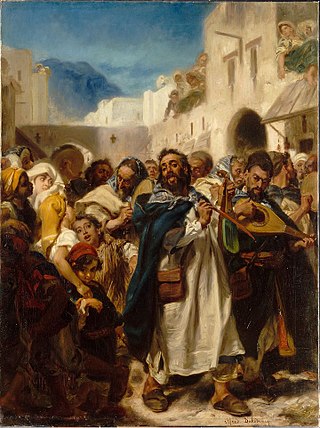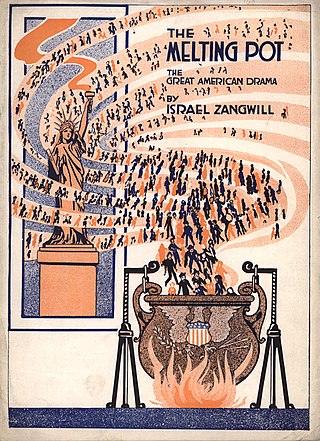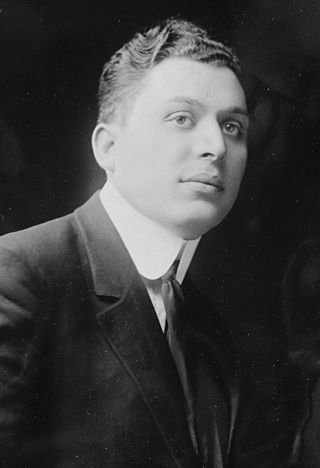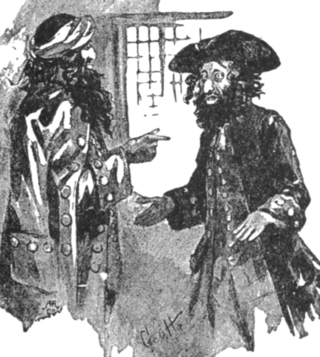Related Research Articles
Chauvinism is the unreasonable belief in the superiority or dominance of one's own group or people, who are seen as strong and virtuous, while others are considered weak, unworthy, or inferior. The Encyclopaedia Britannica describes it as a form of excessive and unreasonable patriotism and nationalism, a fervent faith in national excellence and glory.

The Merchant of Venice is a play by William Shakespeare, believed to have been written between 1596 and 1598. A merchant in Venice named Antonio defaults on a large loan on behalf of Bassanio, his dear friend, provided by a Jewish moneylender, Shylock.

Israel Zangwill was a British author at the forefront of cultural Zionism during the 19th century, and was a close associate of Theodor Herzl. He later rejected the search for a Jewish homeland in Palestine and became the prime thinker behind the territorial movement.
Yiddish theatre consists of plays written and performed primarily by Jews in Yiddish, the language of the Central European Ashkenazi Jewish community. The range of Yiddish theatre is broad: operetta, musical comedy, and satiric or nostalgic revues; melodrama; naturalist drama; expressionist and modernist plays. At its height, its geographical scope was comparably broad: from the late 19th century until just before World War II, professional Yiddish theatre could be found throughout the heavily Jewish areas of Eastern and East Central Europe, but also in Berlin, London, Paris, Buenos Aires and New York City.

Jewish culture is the culture of the Jewish people, from its formation in ancient times until the current age. Judaism itself is not a faith-based religion, but an orthoprax and ethnoreligion, pertaining to deed, practice, and identity. Jewish culture covers many aspects, including religion and worldviews, literature, media, and cinema, art and architecture, cuisine and traditional dress, attitudes to gender, marriage, family, social customs and lifestyles, music and dance. Some elements of Jewish culture come from within Judaism, others from the interaction of Jews with host populations, and others still from the inner social and cultural dynamics of the community. Before the 18th century, religion dominated virtually all aspects of Jewish life, and infused culture. Since the advent of secularization, wholly secular Jewish culture emerged likewise.

In the Hebrew Bible, ' Nahshon' was a tribal leader of the Judahites during the wilderness wanderings of the Book of Numbers. In the King James Version, the name is spelled Naashon, and is within modern Rabbinical contexts often transliterated as Nachshon.
The Moscow State Jewish (Yiddish) Theatre, also known by its acronym GOSET (ГОСЕТ), was a Yiddish theatre company established in 1919 and shut down in 1948 by the Soviet authorities. During its time in operation, it served as a prominent expression of Jewish culture in Russia under Joseph Stalin. Under its founding artistic director, Alexander Granowsky, productions were heavily influenced by the avant-garde trends of Europe and many reflected an expressionistic style. Summertime tours to rural shtetls were extremely popular. At the end of a 1928 tour in Germany, Granowsky defected to the west, and Solomon Mikhoels became artistic director in his place. During Mikhoels' tenure the theatre branched out beyond classic Yiddish theatre productions to include works by Soviet Yiddish writers and William Shakespeare. The theatre continued to operate during World War II in Moscow and, after the evacuation of the city in 1943, in Tashkent. Mikhoels was murdered by the MVD in 1948 and his successor, Benjamin Zuskin, was arrested shortly after. In 1948 the Soviet authorities ordered the theatre to be shut down along with all other Yiddish theatre companies in the Soviet Union.

Ernst Deutsch, also known as Ernest Dorian, was a Jewish Austrian actor. In 1916, his performance as the protagonist in the world première of Walter Hasenclever's Expressionist play The Son in Dresden was praised. Deutsch also played the antihero Famulus in Paul Wegener's The Golem: How He Came into the World in 1920. He is known by English-speaking audiences for his role as Baron Kurtz in Carol Reed's 1949 film noir, The Third Man.

The Melting Pot is a play by Israel Zangwill, first staged in 1908. It depicts the life of a Russian Jewish immigrant family, the Quixanos, in the United States. David Quixano has survived a pogrom, which killed his mother and sister, and he wishes to forget this horrible event. He composes an "American Symphony" and wants to look forward to a society free of ethnic divisions and hatred, rather than backward at his traumatic past.

Sholom Secunda was an American composer of Ukrainian-Jewish descent, best known for the tunes of "Bei Mir Bistu Shein" and "Donna Donna".

Morris Gest was an American theatrical producer of the early 20th century.
Nahshon ben Zadok Gaon was head of the Academy of Sura from 874 to 882, in succession to Mar Amram ben Sheshna. He wrote explanations to difficult words in the Talmud, not in alphabetical order, as did his contemporary Gaon Ẓemaḥ ben Paltoi of Pumbedita, but in the order of the tractates. The Re'umah, on ritual slaughtering, is ascribed to him, but his authorship is doubtful.
Edward Norman "Ike" Corey was a Major League Baseball pitcher. Corey played one game in his career, in the 1918 season, with the Chicago White Sox. He pitched two innings, giving up one run, on two hits, with one walk allowed. He had a 4.50 ERA.
Sura Academy was a Jewish yeshiva located in Sura in what is now southern Iraq, a region known in Jewish texts as "Babylonia". With Pumbedita Academy, it was one of the two major Jewish academies from the year 225 CE at the beginning of the era of the Amora sages until 1033 CE at the end of the era of the Gaonim. Sura Academy was founded by the Amora Abba Arikha ("Rav"), a disciple of Judah ha-Nasi. Among the well-known sages that headed the yeshiva were Rav Huna, Rav Chisda, Rav Ashi, Yehudai ben Nahman, Natronai ben Hilai, Saadia Gaon, and others.

Shylock is a fictional character in William Shakespeare's play The Merchant of Venice. A Venetian Jewish moneylender, Shylock is the play's principal villain. His defeat and conversion to Christianity form the climax of the story.

Jacob Ben-Ami was a noted Belarusian-born Jewish stage actor who performed equally well in Yiddish and English.
Charles Zachary Barnett was an English librettist and playwright of Jewish descent notable for writing the libretti for two operas by his brother the composer John Barnett as well as for his early theatrical adaptations of the works of Charles Dickens.

The King of Schnorrers is Israel Zangwill's 1894 picaresque novel, a collection of amusing tragicomic episodes of schnorring by "Manasseh Bueno Barzillai Azevedo da Costa, thenceforward universally recognised, and hereby handed down to tradition, as the King of Schnorrers", in England on the break of 18th/19th centuries, illustrated by Jewish prints and caricatures of the period.
Children of the Ghetto is an 1899 play written by British author Israel Zangwill. It is loosely based on Zangwill's 1892 novel of the same name. It is a drama in four acts, each with a subtitle and its own setting. The play is set around 1874, within the Jewish Quarter of London. The main plot centers on the love-affair of a young couple, thwarted from marrying by an obscure religious law and an unfortunate joke. The action of the play spans a hundred days time starting at Hanukkah.
Edna Nahshon is professor of Jewish theater and drama at the Jewish Theological Seminary of America. Her interests include Yiddish and Israeli theater and drama. She is also and a senior fellow at Oxford University's Centre for Hebrew and Jewish Studies.